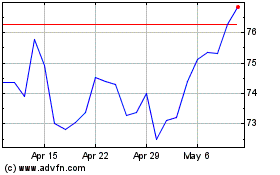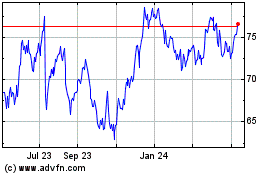State Street Records Second-Quarter After-Tax Charge of $251 Million, or $0.50 Per Share
July 07 2010 - 7:06AM
Business Wire
State Street Corporation (NYSE:STT) announced today that it
recorded a second quarter 2010 after-tax charge of $251 million,
including a related cash contribution to certain common and
collective trust funds managed by State Street Global Advisors
(“SSgA”) that engage in securities lending (the “SSgA lending
funds”). The one-time $330 million cash contribution establishes a
market-based net asset value (“NAV”) per unit of the collateral
pools held by the SSgA lending funds of $1.00 as of June 30, 2010.
The cash contribution also enables SSgA to remove, as of August
2010, the redemption restrictions from the SSgA lending funds and
mitigates potential liability concerns. Additionally, State Street
accrued $9 million of related costs, which are included in the
charge.
State Street’s securities lending operations comprise two
components: the SSgA lending funds, referenced above, with a broad
range of investment objectives that are managed by SSgA; and an
agency lending program for third-party investment managers and
asset owners, the collateral pools for which are referred to as
agency lending collateral pools. Redemption restrictions were
instituted with respect to certain SSgA lending funds and agency
lending collateral pools in the fall of 2008 during the disruption
in the financial markets. State Street has identified potential
inconsistencies with its implementation of those redemption
restrictions applicable to certain agency lending collateral pools.
The Company has also established a reserve of $75 million,
reflected in the charge described above, to address these
issues.
For its agency lending program clients, State Street today
announced a plan to increase client access to liquidity. By the end
of 2010, State Street intends to separate agency lending collateral
pools, with total net assets of $51.6 billion and a weighted
average NAV of $0.989 as of June 30, 2010, into two different
pools. One pool will have complete liquidity, and the other pool,
holding primarily longer-dated securities, will be subject to
continued restrictions on redemptions.
Commenting on these actions, Joseph L. Hooley, State Street’s
president and chief executive officer, said, “Today’s announcement
demonstrates our commitment to resolving the challenges resulting
from the market turmoil over the past several years.”
Regarding the results for the second quarter of 2010, which will
be reported on July 20, Hooley added, “Our strong operating-basis
results are supported by momentum in our servicing fee revenue as
well as improvement in trading services fee revenue. These expected
results are consistent with the full-year operating-basis outlook
we provided in the second quarter.”
Second-Quarter 2010
Outlook
State Street expects to report revenue of $2.3 billion and
earnings per share of $0.87 for the second quarter of 2010, which
includes both the above-mentioned after-tax charge of $251 million,
or $0.50 per share, and a one-time tax benefit of $180 million, or
$0.36 per share, due to the restructuring of former non-US conduit
assets.
In addition to presenting State Street’s financial results in
conformity with U.S. generally accepted accounting principles
(GAAP), management also presents results on an “operating basis” in
order to highlight comparable financial trends and other
characteristics with respect to State Street’s ongoing business
operations from period to period. Non-GAAP financial measures
should be considered in addition to, not as a substitute for or
superior to, financial measures determined in accordance with
GAAP.
On an operating basis, State Street expects to report
second-quarter earnings per share of $0.93 on revenue of $2.2
billion. Operating-basis results include approximately $(48)
million of net losses related to investment securities and a
provision for credit losses of approximately $10 million and
exclude the charge and one-time tax benefit as well as discount
accretion of $172 million, merger and integration costs associated
with acquisitions of $41 million, and expense of approximately $21
million due to a tax on bonus payments in the United Kingdom.
Operating-basis revenue includes net interest revenue on a fully
taxable-equivalent basis.
Additional
Information
State Street continues to cooperate with the Securities and
Exchange Commission in its investigation, and to address civil
litigation, with respect to State Street’s securities lending
programs.
State Street Corporation (NYSE: STT) is one of the world's
leading providers of financial services to institutional investors,
including investment servicing, investment management, and
investment research and trading. With $19 trillion in assets under
custody and administration and $1.9 trillion in assets under
management at March 31, 2010, State Street operates in 25 countries
and more than 100 geographic markets worldwide. For more
information, visit State Street at www.statestreet.com.
Forward Looking
Statements
This news release contains forward-looking statements as defined
by United States securities laws, including statements about our
goals and expectations regarding our business, including the
effects of the collateral pool contribution, actions and plans
described herein, financial condition, results of operations and
strategies, the financial and market outlook, governmental and
regulatory initiatives and developments, and the business
environment. Forward-looking statements are often, but not always,
identified by such forward-looking terminology as “plan,” “expect,”
“look,” “believe,” “anticipate,” “estimate,” “seek,” “may,” “will,”
“trend,” “target” and “goal,” or similar statements or variations
of such terms. These statements are not guarantees of future
performance, are inherently uncertain, are based on current
assumptions that are difficult to predict and involve a number of
risks and uncertainties. Therefore, actual outcomes and results may
differ materially from what is expressed in those statements, and
those statements should not be relied upon as representing our
expectations or beliefs as of any date subsequent to the date of
this news release.
Important factors that may affect future results and outcomes
include, but are not limited to:
- changes in law or regulation
that may adversely affect our, our clients’ or our counterparties’
business activities and the products or services that we sell,
including additional or increased taxes or assessments thereon, the
requirement that additional capital be maintained and changes that
expose us to risks related to compliance;
- financial market disruptions and
the economic recession, whether in the U.S. or internationally, and
monetary and other governmental actions, including regulation,
taxes and fees, designed to address or otherwise be responsive to
such disruptions and recession, including actions taken in the U.S.
and internationally to address the financial and economic
disruptions that began in 2007;
- increases in the volatility of,
or declines in the levels of, our net interest revenue, changes in
the composition of the assets on our consolidated balance sheet and
the possibility that we may be required to change the manner in
which we fund those assets;
- the financial strength and
continuing viability of the counterparties with which we or our
clients do business and to which we have investment, credit or
financial exposure;
- the liquidity of the U.S. and
international securities markets, particularly the markets for
fixed-income securities, and the liquidity requirements of our
clients;
- the credit quality, credit
agency ratings, and fair values of the securities in our investment
securities portfolio, a deterioration or downgrade of which could
lead to other-than-temporary impairment of the respective
securities and the recognition of an impairment loss in our
consolidated statement of income;
- the maintenance of credit agency
ratings for our debt and depository obligations as well as the
level of credibility of credit agency ratings;
- the performance and demand for
the products and services we offer, including the level and timing
of redemptions and withdrawals from our collateral pools and other
collective investment products;
- the risks that acquired
businesses will not be integrated successfully, or that the
integration will take longer than anticipated, that expected
synergies will not be achieved or unexpected disynergies will be
experienced, that client and deposit retention goals will not be
met, that other regulatory or operational challenges will be
experienced and that disruptions from the transaction will harm
relationships with clients, employees or regulators;
- the ability to complete
acquisitions, divestitures and joint ventures, including the
ability to obtain regulatory approvals, the ability to arrange
financing as required, and the ability to satisfy other closing
conditions;
- the possibility of our clients
incurring substantial losses in investment pools where we act as
agent, and the possibility of further general reductions in the
valuation of assets;
- our ability to attract deposits
and other low-cost, short-term funding;
- potential changes to the
competitive environment, including changes due to the effects of
consolidation and perceptions of State Street as a suitable service
provider or counterparty;
- the level and volatility of
interest rates and the performance and volatility of securities,
credit, currency and other markets in the U.S. and
internationally;
- our ability to measure the fair
value of the investment securities on our consolidated balance
sheet;
- the results of litigation,
government investigations and similar disputes or proceedings;
- adverse publicity or other
reputational harm;
- our ability to grow revenue,
attract and/or retain and compensate highly skilled people, control
expenses and attract the capital necessary to achieve our business
goals and comply with regulatory requirements;
- our ability to control operating
risks, information technology systems risks and outsourcing risks,
and our ability to protect our intellectual property rights, the
possibility of errors in the quantitative models we use to manage
our business and the possibility that our controls will fail or be
circumvented;
- the potential for new products
and services to impose additional costs on us and expose us to
increased operational risk;
- changes in accounting standards
and practices; and
- changes in the interpretation of
existing tax laws by U.S. and non-U.S. tax authorities that impact
the amount of taxes due.
Other important factors that could cause actual results to
differ materially from those indicated by any forward-looking
statements are set forth in our 2009 Annual Report on Form 10-K,
and our subsequent SEC filings. We encourage investors to read
these filings, particularly the sections on Risk Factors, for
additional information with respect to any forward-looking
statements and prior to making any investment decision. The
forward-looking statements contained in this news release speak
only as of the date hereof, July 7, 2010, and we do not undertake
efforts to revise those forward-looking statements to reflect
events after this date.
State Street (NYSE:STT)
Historical Stock Chart
From May 2024 to Jun 2024

State Street (NYSE:STT)
Historical Stock Chart
From Jun 2023 to Jun 2024
